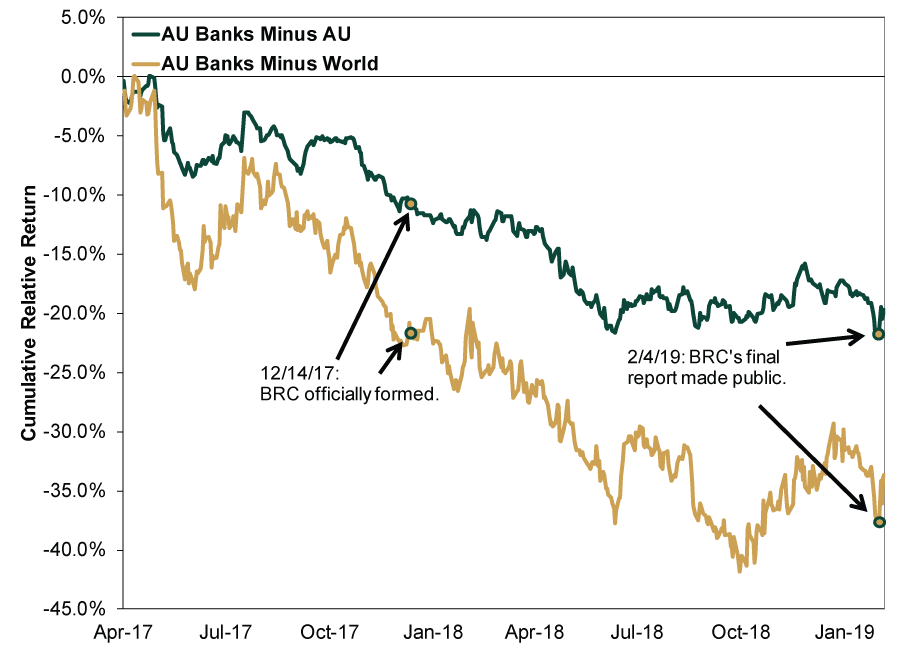Personal Wealth Management / Market Analysis
The Benefits of Falling Uncertainty: Aussie Edition
The end of Australia’s Banking Royal Commission highlights how removing a long-lingering fear is a positive for stocks.
Last week, a yearlong inquiry into Australian Financials’ misconduct—officially known as the Royal Commission into Misconduct in the Banking, Superannuation and Financial Services Industry (Banking Royal Commission or BRC)—wrapped up. The resolution is a good example of how removing a long-lingering fear—and allowing companies and investors to move on with life—is often positive for stocks.
In this bull market’s early years, Australian banks enjoyed a stellar reputation—particularly since they got through the 2008 Financial Crisis largely unscathed. However, allegations of misconduct began cropping up soon thereafter. Some claimed Australia’s biggest banks manipulated the market by rigging the primary interest rate—inflating their profits at the expense of borrowers. Others suggested banks were complacent and allowed illicit practices like money laundering. Many also alleged they knowingly sold poor investment products to retirement savers, targeting fat commissions. By late 2017, politicians—particularly in the opposition Labor Party—were talking of action. The government couldn’t ignore the pressure. Initially, then-Prime Minister Malcolm Turnbull tapped the government’s Productivity Commission to investigate. But its power is limited, queuing calls for a much stronger response—namely, a Royal Commission. For Commonwealth nations like Australia, the government calls commissions when an issue looks to be beyond its resources, as existing ministries and regulatory agencies may not have the manpower or authority to tackle the problem. Eventually, Turnbull caved and convened the BRC.
After the BRC started in March 2018, there were 68 public hearings—and every major financial institution admitted some form of misconduct. The fallout: significant management turnover. Numerous CEOs, chairmen and senior managers at big Aussie Financials have either been sacked or stepped down recently—primarily related to this scandal. Many feared the BRC wasn’t done there—speculating it could split up Australia’s four biggest banks, which dominate the industry.
On February 4, the BRC released a 500-page document containing its findings, which included 76 recommendations to improve conduct and realign the banking industry’s incentives. Beyond broad guidance regarding better enforcing existing laws and improving clarity on fees, some groups will likely see material change. The BRC found mortgage brokers’ business model rife with conflicts of interest and in need of reform—for example, charging fees directly to consumers. Some also speculate bank CEOs guilty of dishonest conduct—like charging customers fees without providing a service—may face criminal charges. However, the outcome wasn’t as disruptive as expected. The BRC didn’t propose any major changes to the Aussie Financial industry’s structure or how it operates. They also didn’t break up Australia’s big four.
In my view, BRC resolution is a prime example of how passing political uncertainty can be a positive for stocks. Since Australia’s Parliament made its first official inquiry into the Financials sector in early 2017, Aussie banks have badly lagged the broader Australian market and global equities overall.
Exhibit 1: Australian Bank Relative Returns Vs. Australia and the World

Source: FactSet, as of 2/8/2019. MSCI Australia/Banks Index, MSCI Australia Index and MSCI World Index, price returns, 4/3/2017 – 2/8/2019.
After the BRC released its report, Australian banks had a sizable relief rally, outperforming global stocks by 5% last week.[i] Now, not everything is positive. Increased oversight and new regulations could bring unintended consequences. For example, holding CEOs criminally responsible echoes the US’s 2002 Sarbanes-Oxley law—which contributed to 2008’s Financial Crisis. However, investors now have a better idea of what will and won’t happen. Being able to get on with it and get past that uncertainty is a powerful bullish force.
The BRC saga exemplifies how regulatory uncertainty can weigh on stocks for a while. Getting past that uncertainty removes this headwind. Even though the BRC led to some increased oversight and new regulations—which aren’t necessarily positives despite the good intent underlying them—stocks don’t need a perfect world to move higher. Investors should keep this in mind for future instances of political or regulatory uncertainty passing—perhaps even as a microcosm for Brexit.
[i] Source: FactSet, as of 2/11/2019. MSCI Australia Banks Index and MSCI World Index, price returns, 2/4/2019 – 2/8/2019.
If you would like to contact the editors responsible for this article, please message MarketMinder directly.
*The content contained in this article represents only the opinions and viewpoints of the Fisher Investments editorial staff.
Get a weekly roundup of our market insights
Sign up for our weekly e-mail newsletter.

You Imagine Your Future. We Help You Get There.
Are you ready to start your journey to a better financial future?

Where Might the Market Go Next?
Confidently tackle the market’s ups and downs with independent research and analysis that tells you where we think stocks are headed—and why.





